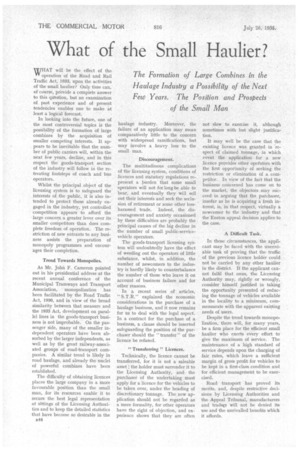What of the Small Haulier?
Page 62

If you've noticed an error in this article please click here to report it so we can fix it.
'WHAT will be the effect of the VI' operation of the Road and Rail . Traffic Act, 1933, upon the activities of the small haulier? Only time can, of course, prOvide a complete answer to this qu'estion, but an examination of past experience and of present tendencies enables one to make at least a logical forecast.
In looking into the future, one of the most controversial topics is the possibility of the formation of large combines by the acquisition of smaller competing interests. It appears to be inevitable that the number of public carriers will, within the next few years, decline, and in this respect the goods-transport section of the industry will follow in the retreating footsteps of coach and bus operators.
Whilst the principal object of the licensing system is to safeguard the interests of the public, it is also intended to protect those already engaged in the industry, yet controlled competition appears to afford the large concern a greater lever over its smaller competitors than does complete freedom of operation. The restriction of new entrants to any business assists the preparation of monopoly programmes and encourages their completion.
Trend Towards Monopolies.
As Mr. John F. Cameron pointed out in his presidential address at the recent annual conference of the Municipal Tramways and Transport Association, monopolization has been facilitated by the Road Traffic Act, 1930, and in view of the broad similarity between that measure and the 1933 Act, development on parallel lines in the goods-transport business is not improbable. On the passenger side, many of the smaller independent operators have been absorbed by the larger independents, as well as by the great railway-associated groups of road-transport companies. A similar trend is likely in road haulage, and already the nuclei of powerful combines have been established.
The difficulty of obtaining licences places the large company in a more favourable position than the small man, for its resources enable it to secure the best legal representation at sittings of the Licensing Authorities and to keep the detailed statistics that have become sp desirable in the 544 haulage industry. Moreover, the failure of an application may mean comparatively little to the concern with widespread ramifications, but may involve a heavy loss to the small man.
Discouragement.
The multitudinous complications of the licensing system, conditions of licences and statutory regulations represent a burden that some small operators will not for long be able to bear, and eventually they will sell out their interests and seek the seclusion of retirement or some other lessharassed trade. Indeed, the discouragement and anxiety occasioned by these difficulties are probably the principal causes of the big decline in the number of small public-servicevehicle operators.
The goods-transport licensing system will undoubtedly have the effect of weeding out the operators of little substance, whilst, in addition, the number of newcomers to the industry is hardly likely to counterbalance the number of those who leave it on account of business failure and for other reasons.
In a recent series of articles, " S.T.R." explained the economic considerations in the purchase of a haulage business, and it now remains for us to deal with the legal aspect. In a contract for the purchase of a business, a clause should be inserted safeguarding the position of the purchaser should the " transfer " of the licence be refused.
"Transferring " Licences.
Technically, the licence cannot be transferred, for it is not a saleable asset ; the holder must surrender it to the Licensing Authority, and the purchaser of the undertaking must apply for a licence for the vehicles to be taken over, under the heading of discretionary tonnage. The new application should not be regarded as a mere formality, for other operators have the right of objection, and experience shows that they are often not slow to exercise it, although sometimes with but slight justification.
It may well be the case that the existing licence .was granted in 'respect of claimed tonnage, in which event the application for a new licence provides other opefators with the first opportunity of seeking the restriction or elimination of a competitor. In view of the fact that the business concerned has come on to the market, the objectors may succeed in arguing that the purchaser, insofar as he is acquiring a fresh interest, is, in that respect, virtually a newcomer to the industry and that the Elision appeal decision applies to the case.
A Difficult Task.
In those circumstances, the applicant may be faced with the unenviable task of proving that the traffic of the previous licence holder could not be carried by any other haulier in the district. If the applicant cannot fulfil that onus, the Licensing Authority may, rightly or wrongly, consider himself justified in taking the opportunity presented of reducing the tonnage of vehicles available in the locality to a minimum, commensurate with the apparent existing needs of users.
Despite the trend towards monopolization, there will, for many years, be a firm place for the efficient small haulier who exerts every effort to give the maximum of service. The maintenance of a high standard of service depends upon the charging of fair rates, which leave a sufficient margin of gross profit for vehicles to be kept in a first-class condition and for efficient management to be exercised.
Road transport has proved its merits, and, despite restrictive decisions by Licensing Authorities and the Appeal Tribunal, manufacturers and trade4-s will not be denied its use and the unrivalled benefits which it affords.




































































































